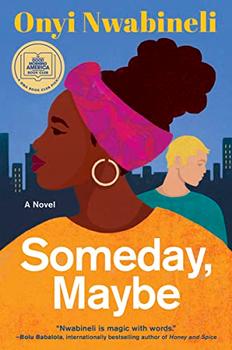Summary | Excerpt | Reading Guide | Reviews | Beyond the Book | Readalikes | Genres & Themes | Author Bio

A Novel
by Onyi NwabineliPROLOGUE
Around the time my husband was dying, I was chipping ice from the freezer in search of the ice cube tray wedged in the back. But only because I was taking a break from filling his voice mail with recriminations about his failure to communicate his whereabouts. The memory of this along with countless other things would weave together the tapestry of blame I laid upon myself in the days and weeks after his death.
Therefore, in the spirit of continued honesty, here are three things you should know about my husband:
And here is one thing you should know about me:
Bonus fact: No. I am not okay.
Home
1
I read somewhere once that going through a breakup is like experiencing the death of a partner. They called it a "kind of bereavement." While there are certain similarities—the spontaneous tears, the despair, the need to press items of clothing to your face and inhale the lingering scent of your beloved—this sentiment is incorrect. Bullshit. Well-meaning, perhaps, but bullshit nonetheless. Of course death trumps breakups. Always. How could it not?
Death makes it impossible for you to demand a list of reasons for the demise of your relationship. Logging on to Instagram to stalk his profile reaps a hollow reward; there will be no updates, no new faces, no experiences lived without you. Your beloved is frozen in time. There are no relapses, unplanned nights of passion wreathed in nostalgia followed by bittersweet, awkward mornings where you navigate the putting on of clothes, suddenly aware your jeans are ripped, your underarms unshaven for the past three weeks.
But the worst thing about death, the thing that makes the comparison laughable, almost cruel, is there is no chance of reconciliation. With death there are no do-overs. No drunk-dialing snowballing into hour-long reminiscences that end in reunion—the kind of sheet-tangling makeup sex that makes you stop in your tracks when you are besieged by a flashback. This isn't something that can be forgiven with a kiss.
With death your suffering is permanent.
When someone you love dies, there's this period of disbelief—a time of dug-in heels, the refusal to process your new reality. A preamble to real Denial, which brings its falsehoods and proclamations of It's not true and Not you, girl. Someone else.
I spend the first two days after Quentin dies pacing the house, twitching curtains to watch the parade of visitors arriving only to be sent away and dodging the arms of my family, who, after the police finally ceased their questions, begin asking their own. "How could this happen, Eve?"
"Did he have a doctor, Eve?"
"But you saw him that day, no? How did he seem, Eve?" Eve, Eve, Eve. My own name becomes a curse. I have no answers for them.
Then, when I learn that there is to be a postmortem, the emotional duct tape keeping me together finally gives way. I take to my bed like a consumptive Victorian lady. And so here I am. I can no longer miss him like I have been, like there's an end in sight. I am no longer suspended in that terrible limbo. He is gone. The house is silent, his noises conspicuously absent. He is not coming back. The realization keeps hitting me, clubbing me over the head, pounding away at the back of my skull.
It would have been a lot easier to just break up with me. But Q was nothing if not thorough.
* * *
In the film Run Lola Run—one of Q's favorites and eventually one of mine—Lola, the red-haired heroine, sprints through the streets of Berlin in a bid to procure an obscene amount of money to save her hapless boyfriend, Manni. She runs because she has only twenty minutes to secure the cash. During her mad dash to save a man whom, frankly, she might have been better off leaving to perish, she bumps into strangers along the way. The best thing about this film and one of the reasons Q fell in love with it is that we, the viewer, are shown flash-forward sequences depicting the futures of those Lola meets. We are privy to the consequences of Lola's fleeting interactions with these people and they are often lovely or sad. It's a wonderful thing to watch and watch it we did, repeatedly, never tiring of Franka Potente's questionable late-90s fashion or the way we felt when the credits began to roll: spent, like we had done the running ourselves, but also sort of grateful.
Excerpted from Someday, Maybe by Onyi Nwabineli. Copyright © 2022 by Onyi Nwabineli. Excerpted by permission of Graydon House. All rights reserved. No part of this excerpt may be reproduced or reprinted without permission in writing from the publisher.
Second hand books are wild books...
Click Here to find out who said this, as well as discovering other famous literary quotes!
Your guide toexceptional books
BookBrowse seeks out and recommends the best in contemporary fiction and nonfiction—books that not only engage and entertain but also deepen our understanding of ourselves and the world around us.